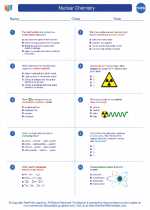Industry in Chemistry
Industry plays a crucial role in the field of chemistry, as it involves the practical application of chemical processes to produce a wide range of products. Understanding the principles of chemistry is essential for the development and improvement of industrial processes. Here's a study guide to help you understand the role of industry in chemistry:
Key Concepts
- Chemical Processes: Understand the various chemical reactions and processes involved in industrial production, such as synthesis, purification, and separation techniques.
- Industrial Applications: Explore the diverse applications of chemistry in industries, including pharmaceuticals, petrochemicals, polymers, and agriculture.
- Sustainability: Learn about green chemistry principles and sustainable practices in industrial processes to minimize environmental impact.
- Safety Measures: Recognize the importance of safety protocols and regulations in industrial chemistry to prevent accidents and ensure workplace safety.
- Quality Control: Grasp the significance of quality control measures in industrial chemistry to maintain product consistency and safety standards.
Study Tips
- Practical Applications: Explore real-world examples of chemical processes in industries through case studies and industry reports.
- Lab Experience: Gain hands-on experience in laboratory settings to understand the practical aspects of industrial chemistry, including equipment and procedures.
- Current Trends: Stay updated with the latest developments and innovations in industrial chemistry through scientific journals and industry publications.
- Collaborative Learning: Engage in group discussions and collaborative projects to explore the interdisciplinary nature of industrial chemistry.
- Problem-Solving: Practice solving industrial chemistry-related problems to enhance your critical thinking and analytical skills.
Further Exploration
Delve deeper into specific industries, such as the pharmaceutical, food, or energy sectors, to understand the unique chemical processes and challenges they face. Additionally, consider exploring the role of government regulations and international standards in shaping industrial chemistry practices.
By mastering the principles of industrial chemistry, you'll gain a comprehensive understanding of the vital role chemistry plays in driving technological advancements and meeting societal needs.
.◂Chemistry Worksheets and Study Guides High School. Nuclear Chemistry

 Worksheet/Answer key
Worksheet/Answer key
 Worksheet/Answer key
Worksheet/Answer key
